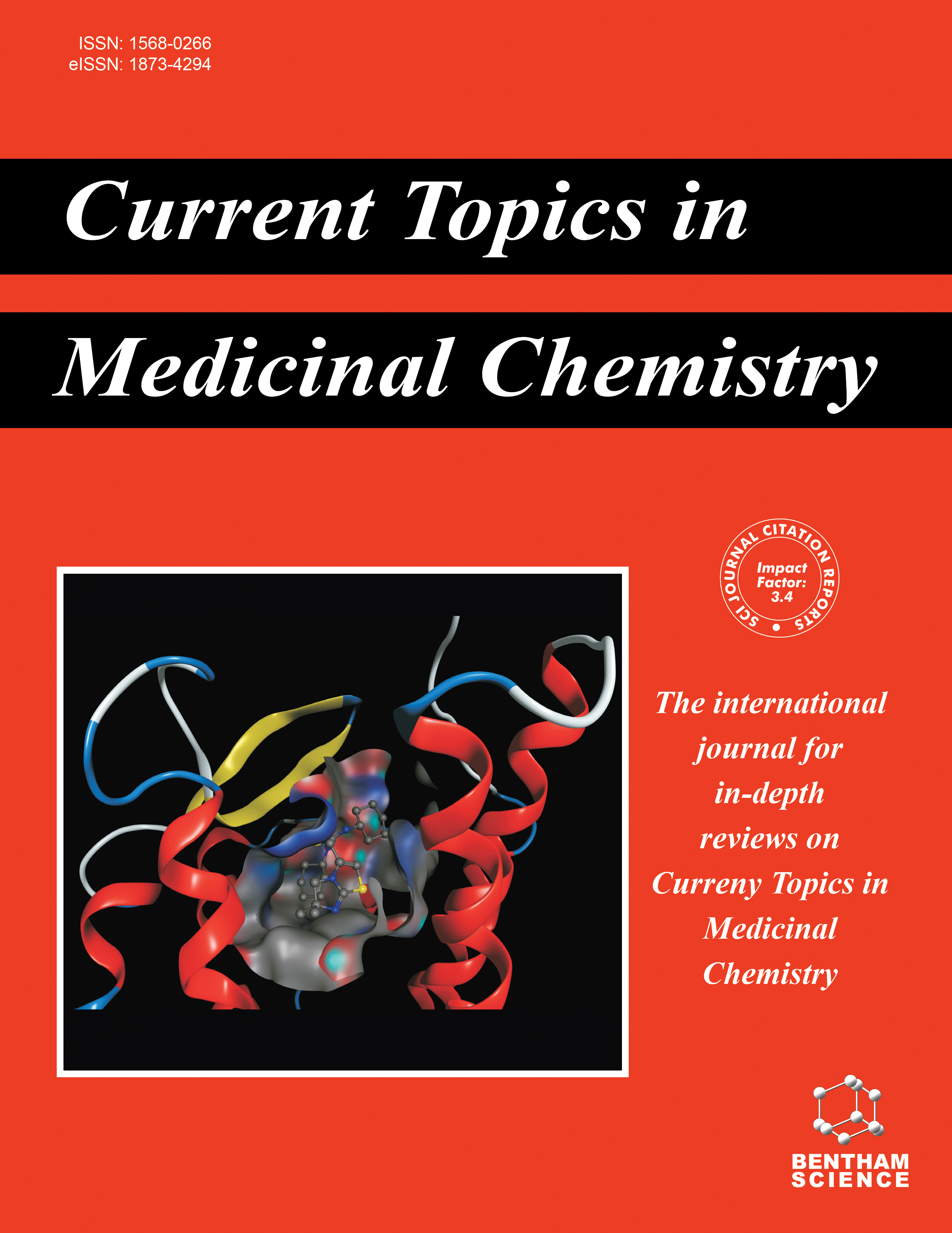Current Topics in Medicinal Chemistry - Volume 18, Issue 28, 2018
Volume 18, Issue 28, 2018
-
-
The Development of Epigenetics and Related Inhibitors for Targeted Drug Design in Cancer Therapy
More LessAuthors: Na Liu, Rongtong Zhao, Yue Ma, Dongyuan Wang, Chen Yan, Dongxian Zhou, Feng Yin and Zigang LiEpigenetics process is the heritable change in gene function that does not involve changes in the DNA sequence. Until now, several types of epigenetic mechanisms have been characterized, including DNA methylation, histone modification (acetylation, methylation, etc.), nucleosome remodeling, and noncoding RNAs. With the biological investigations of these modifiers, some of them are identified as promoters in the process of various diseases, such as cancer, cardiovascular disease and virus infection. Epigenetic changes may serve as potential “first hits” for tumorigenesis. Hence, targeting epigenetic modifiers is being considered as a promising way for disease treatment. To date, six agents in two epigenetic target classes (DNMT and HDAC) have been approved by the US Food and Drug Administration (FDA). Most of these drugs are applied in leukemia, lymphoma therapy, or are combined with other drugs for the treatment of solid tumor. Due to the rapid development of epigenetics and epigenetics targeted drugs, it is becoming an emerging area in targeted drug design.
-
-
-
Epigenetic Targets and their Inhibitors in Cancer Therapy
More LessAuthors: Le Zhao, Yong-Tao Duan, Ping Lu, Zhi-Juan Zhang, Xiao-Ke Zheng, Jun-Lei Wang and Wei-Sheng FengEpigenetics is defined as the stable and heritable alternations in gene expression without changing the DNA nucleotide sequence. The initiation and progression of cancer result from not only genetic mutation, but also aberrant epigenetic regulation, such as DNA methylation and histones acetylation. Although Genetic alternations cannot be reversed, epigenetic modification is a dynamic and reversible process. Over the past few decades, much progress has been made in the research of epigenetic medications and a variety of drugs have been developed targeting at epigenetic regulatory proteins, which are capable of restoring malignant cancer cells to the normal state. The epigenetic drugs currently approved for cancer treatment mainly target at DNA methylation and histones acetylation. In addition, there are a great many epigenetic drugs in clinical trials for cancer therapy, such as inhibitors of DNA methyltransferases, histone deacetylases, histone methyltransferases, lysine specific demethylases, and BET (bromodomain and extra-terminal domain) family proteins. We will discuss the latest developments of these inhibitors and their applications in cancer therapy.
-
-
-
Histone Deacetylase Inhibitors in Cancer Therapy
More LessAuthors: Yijie Sun, Yanyi Sun, Saichao Yue, Yaohe Wang and Fanghui LuHistone deacetylases (HDACs), as epigenetic modifiers, are essential for gene transcriptional activities. The alternation of HDACs expression, mutation and/or inappropriate recruitments has been discovered in a broad range of tumors contributing to the tumorigenesis through a serial of biological pathways. HDACs, therefore, are characterized as promising cancer therapeutic targets, and their inhibitors are under rapid development. Here, we discuss HDAC inhibitors in terms of their functional mechanism establishing the anti-tumor effects and potential clinical applications including the synergistic effects in combinational treatment.
-
-
-
Structure, Functions and Selective Inhibitors of HDAC6
More LessHistone deacetylases 6 (HDAC6) has emerged as a promising target for the treatment of various human diseases including cancer, neurodegenerative disease and immunology due to its unique structure, substrate and biological functions. HDAC6 is involved in cell motility, cell survival, cell cycle progression, developmental events, prognosis as well as protein degradation and the involvement of HDAC6 in multiple biological processes has gained lots of attention. There is increasing interest in HDAC6 and its selective inhibitors. More than twenty years of synthetic efforts have developed various HDAC6 selective inhibitors with different Cap, linker and ZBG. This review will summarize recent research data regarding HDAC6 and various HDAC6 selective inhibitors.
-
-
-
DNA Methyltransferase Inhibitors and their Therapeutic Potential
More LessAuthors: Zehao Zhou, Huan-Qiu Li and Feng LiuAberrant DNA methylation at the 5-position of cytosine, catalyzed by DNA methyltransferases (DNMTs), is associated with not only various cancers by silencing of tumor suppressor genes but also other diseases. The DNMTs, especially the DNMT1, DNMT3A and DNMT3B, are often overexpressed in various cancer tissues and cell lines. DNMTs are important epigenetic targets for drug development since the DNA methylation is reversible. This review summarizes an array of nucleoside and non-nucleoside inhibitors of DNMTs, as well as their biological activities. Among these inhibitors, the nucleoside analogue azacytidine and its deoxy derivative decitabine are both irreversible DNMT inhibitors and approved for the treatment of myelodysplastic syndrome.
-
Volumes & issues
-
Volume 25 (2025)
-
Volume 24 (2024)
-
Volume 23 (2023)
-
Volume 22 (2022)
-
Volume 21 (2021)
-
Volume 20 (2020)
-
Volume 19 (2019)
-
Volume 18 (2018)
-
Volume 17 (2017)
-
Volume 16 (2016)
-
Volume 15 (2015)
-
Volume 14 (2014)
-
Volume 13 (2013)
-
Volume 12 (2012)
-
Volume 11 (2011)
-
Volume 10 (2010)
-
Volume 9 (2009)
-
Volume 8 (2008)
-
Volume 7 (2007)
-
Volume 6 (2006)
-
Volume 5 (2005)
-
Volume 4 (2004)
-
Volume 3 (2003)
-
Volume 2 (2002)
-
Volume 1 (2001)
Most Read This Month


